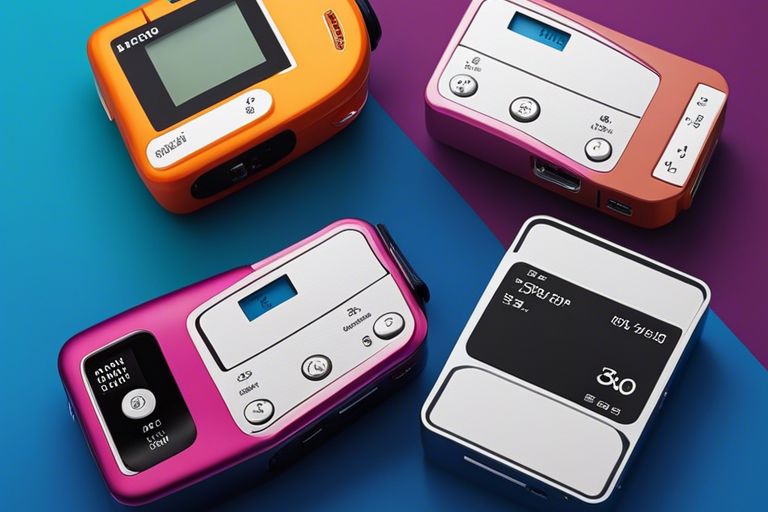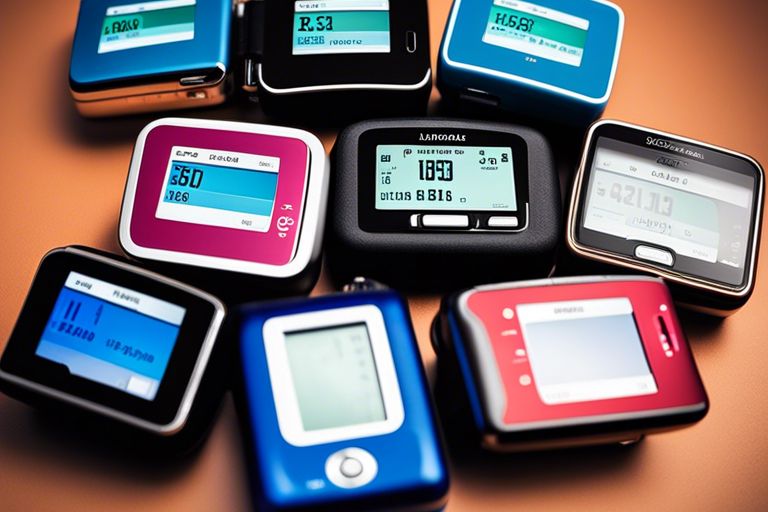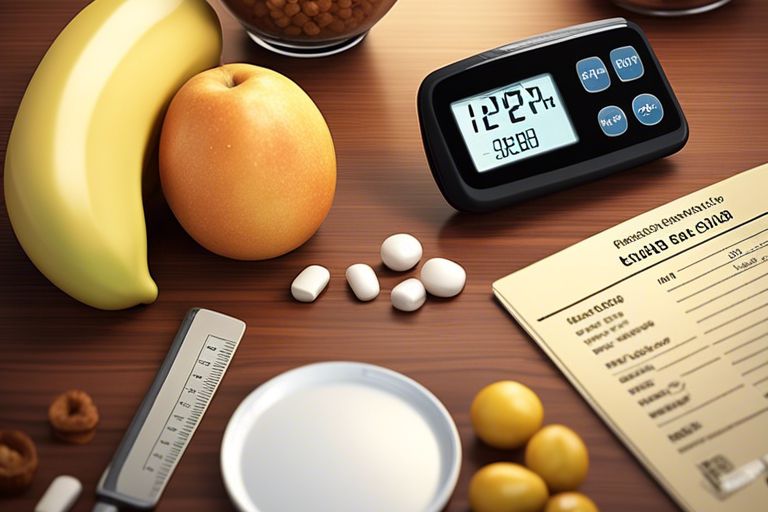Embark on a journey towards mastering the art of managing Type 1 Diabetes with our comprehensive guide. This step-by-step manual is designed to provide you with the knowledge and tools necessary to take control of your condition and live a fulfilling life. From understanding the basics of insulin management to practical tips on monitoring blood sugar levels, this guide covers all the essentials for maintaining optimal health and well-being. Say goodbye to uncertainty and confusion, and empower yourself with the knowledge to effectively manage your Type 1 Diabetes.
Key Takeaways:
- Monitor blood sugar levels: Regularly check and monitor blood sugar levels to understand how different factors such as diet, exercise, and medication affect your levels.
- Follow a balanced diet: Consistently maintain a balanced diet with the appropriate amounts of carbohydrates, proteins, and fats to help manage blood sugar levels.
- Stay active: Incorporate regular exercise into your routine to improve insulin sensitivity and overall blood sugar control.
- Take medication as prescribed: Ensure you take your insulin or other prescribed medications as directed by your healthcare provider to effectively manage blood sugar levels.
- Stay informed and seek support: Stay up to date on the latest information regarding type 1 diabetes management and seek support from healthcare professionals, support groups, or online communities.
Starting With the Basics
Managing type 1 diabetes requires a careful balance of medication, diet, exercise, and monitoring. It may seem overwhelming at first, but by starting with the basics, you can establish a solid foundation for control and lead a healthier life.
How-To Establish Your Baseline
With type 1 diabetes, it’s crucial to understand your body’s unique needs and responses to insulin. Begin by keeping a detailed record of your blood sugar levels, insulin intake, meals, and physical activity. This data will help you and your healthcare team establish a baseline for your diabetes management plan.
By monitoring your blood sugar consistently and recording the results, you can identify patterns and make informed decisions about adjustments to your insulin dosage, diet, or exercise routine. This personalized approach is key to achieving stable blood sugar levels and preventing complications in the long run.
Tips for Daily Blood Sugar Monitoring
Baseline blood sugar levels can fluctuate throughout the day, making it essential to check your blood sugar regularly. Invest in a reliable glucose meter and carry it with you wherever you go. Set specific times for testing, such as before and after meals, before bedtime, and when you feel unwell.
- Keep a log of your blood sugar readings to track trends and share them with your healthcare provider during check-ups.
After establishing your baseline, aim to maintain your blood sugar levels within your target range. This may require adjustments to your insulin regimen, meal planning, or physical activity. Consistent monitoring and proactive management will help you stay in control of your diabetes.
- After discussing any significant changes with your healthcare team, update your diabetes management plan accordingly.
Diet and Nutrition
When it comes to managing type 1 diabetes, diet and nutrition play a crucial role. What you eat directly impacts your blood sugar levels, so it’s essential to make informed choices about your meals and snacks. A well-balanced diet can help control blood sugar levels, prevent complications, and improve overall health.
How-To Create a Diabetes-Friendly Meal Plan
Diet plays a significant role in managing type 1 diabetes. Creating a diabetes-friendly meal plan involves focusing on balanced meals that include a variety of nutrients. Start by incorporating whole grains, lean proteins, healthy fats, and plenty of fruits and vegetables into your diet. Consider working with a registered dietitian who specializes in diabetes care to create a personalized meal plan tailored to your specific needs and lifestyle.
Planning ahead is key to successfully managing your blood sugar levels. Aim to space your meals evenly throughout the day and include snacks to prevent blood sugar fluctuations. Monitor your carbohydrate intake and pay attention to how different foods affect your blood sugar levels. Do not forget, consistency is key when it comes to managing type 1 diabetes with diet.
Factors Affecting Blood Sugar and Diet
Affecting factors such as the timing and composition of your meals, your activity level, stress levels, medications, and insulin sensitivity can all impact your blood sugar levels. It’s essential to understand how these factors influence your diabetes management and adjust your diet accordingly.
- Timing of meals and snacks
- Composition of meals (carbohydrate, protein, and fat content)
- Activity level
This comprehensive approach to managing your diet and blood sugar levels can help you make informed choices and maintain better control over your type 1 diabetes. By paying attention to these factors and working closely with your healthcare team, you can develop a personalized nutrition plan that supports your overall health and well-being.
Exercise and Lifestyle
After being diagnosed with Type 1 diabetes, managing your lifestyle becomes crucial in controlling your blood sugar levels. Exercise plays a vital role in this control, but it is essential to approach it safely and with the right strategies.
How-To Incorporate Exercise Safely into Your Routine
Your first step before starting any exercise regimen is to consult with your healthcare provider. They can provide guidance on what types of exercises are safe for you, considering your overall health and diabetes management. Start slowly and gradually increase the intensity of your workouts to avoid sudden spikes or drops in blood sugar levels. Monitoring your glucose levels before, during, and after exercise is crucial to understanding how your body responds to physical activity.
Tips for Managing Diabetes in Daily Life
Planning ahead is key to successfully managing diabetes in your daily life. Make sure to have a routine in place for meals, medication, and exercise to maintain stable blood sugar levels. Keep healthy snacks on hand to combat low blood sugar episodes, and always carry your glucose monitoring supplies with you. Staying hydrated is important, so drink plenty of water throughout the day to help regulate your blood sugar levels.
- Though it may seem overwhelming at first, stay organized and create a schedule that works for you. Consistency is key in managing your diabetes effectively.
Daily stress can impact your blood sugar levels, so incorporating stress management techniques like deep breathing, meditation, or yoga can help keep your glucose levels stable. Quality sleep is essential for overall well-being and diabetes management, so aim for at least 7-8 hours of restful sleep each night.
- Though it may be tempting to skip monitoring your glucose levels or medication doses, remember that consistency is crucial in managing your diabetes properly.
Safely navigating exercise and daily life with Type 1 diabetes requires a combination of knowledge, preparation, and dedication. By following these guidelines and working closely with your healthcare team, you can achieve better control of your blood sugar levels and lead a healthier, more active lifestyle.
Advanced Management Strategies
Despite the challenges that come with managing type 1 diabetes, there are advanced strategies that can help individuals achieve better control over their condition. By incorporating these strategies into your diabetes management plan, you can take proactive steps towards maintaining stable blood sugar levels and improving overall health.
- Utilize Technology for Diabetes Control:
For: Individuals with type 1 diabetes can benefit greatly from the use of continuous glucose monitors (CGMs) and insulin pumps. How: CGMs provide real-time glucose readings and trends, allowing for early detection of highs and lows. Insulin pumps deliver precise insulin doses based on CGM data, offering more control over blood sugar levels.
How-To Utilize Technology for Diabetes Control
For individuals with type 1 diabetes, embracing technology can revolutionize the way you manage your condition. Continuous glucose monitors (CGMs) and insulin pumps offer precise and timely data to make informed decisions about your insulin therapy.
By integrating CGM readings with insulin pump therapy, individuals can achieve tighter blood sugar control and reduce the risk of hypoglycemia. This advanced technology empowers individuals to be more proactive in managing their diabetes and live healthier lives.
Understanding and Adjusting to Body’s Insulin Needs
Utilize effective strategies to understand and adjust to your body’s insulin needs is crucial for managing type 1 diabetes effectively. By recognizing patterns in your blood sugar levels and implementing personalized insulin regimens, you can optimize your diabetes control and minimize fluctuations in glucose levels.
Management of insulin needs involves a combination of factors such as meal timing, physical activity, stress levels, and hormonal changes. By staying vigilant and making necessary adjustments, individuals can achieve better control over their diabetes and lead a more fulfilling life.
Coping Mechanisms and Support
How-To Build a Support System
For individuals managing type 1 diabetes, having a strong support system in place can make a significant difference in their ability to cope with the challenges of the condition. Surrounding yourself with understanding family members, friends, and healthcare professionals can provide emotional support, practical help, and encouragement on this journey. Sharing your struggles and triumphs with those who care about you can alleviate feelings of isolation and provide a sense of community.
To build a support system, start by educating your loved ones about type 1 diabetes and how it impacts your life. Encourage open communication and let them know how they can best support you. Consider joining a diabetes support group either in person or online, where you can connect with others who are facing similar challenges. These communities can be invaluable sources of empathy, advice, and motivation.
Tips for Emotional and Mental Wellbeing
To maintain emotional and mental wellbeing while managing type 1 diabetes, it’s important to prioritize self-care and stress management techniques. Engaging in regular physical activity, practicing mindfulness or meditation, and getting an adequate amount of sleep can help reduce stress levels and improve overall mental health. Additionally, consider seeking professional help from a therapist or counselor if you’re struggling to cope with the emotional toll of diabetes.
System: Surround yourself with positive influences and limit exposure to negative or stressful situations. Participating in activities you enjoy and finding healthy ways to express your emotions can also contribute to your emotional and mental wellbeing.
- Engage in regular physical activity to boost your mood and reduce stress levels.
- Practice mindfulness or meditation to center yourself and ease anxious thoughts. Perceiving the importance of emotional self-care can positively impact your diabetes management and overall well-being.
Final Words
Ultimately, mastering type 1 diabetes control is a journey that requires dedication, knowledge, and perseverance. By following the ultimate how-to guide we have provided, individuals with type 1 diabetes can effectively manage their condition, improve their quality of life, and reduce the risk of complications. Recall, staying informed, working closely with healthcare professionals, monitoring blood sugar levels regularly, and making healthy lifestyle choices are the key components to achieving optimal control over type 1 diabetes. With commitment and a proactive approach, individuals can take charge of their health and thrive despite the challenges of living with type 1 diabetes.
FAQ
Q: What is Type 1 Diabetes?
A: Type 1 Diabetes is a chronic condition where the pancreas produces little to no insulin, which is essential for regulating blood sugar levels in the body.
Q: What are the symptoms of Type 1 Diabetes?
A: Common symptoms of Type 1 Diabetes include extreme thirst, frequent urination, sudden weight loss, fatigue, and blurred vision.
Q: How is Type 1 Diabetes diagnosed?
A: Type 1 Diabetes is diagnosed through blood tests that measure blood sugar levels. Other tests may include a glycated hemoglobin (A1C) test and an oral glucose tolerance test.
Q: What are the key components of managing Type 1 Diabetes?
A: Managing Type 1 Diabetes involves monitoring blood sugar levels regularly, taking insulin as prescribed, following a healthy meal plan, staying physically active, and attending regular check-ups with healthcare providers.
Q: What are the potential complications of not controlling Type 1 Diabetes?
A: If left uncontrolled, Type 1 Diabetes can lead to serious complications such as heart disease, stroke, kidney damage, nerve damage, and vision problems. It is crucial to manage the condition effectively to prevent these complications.




